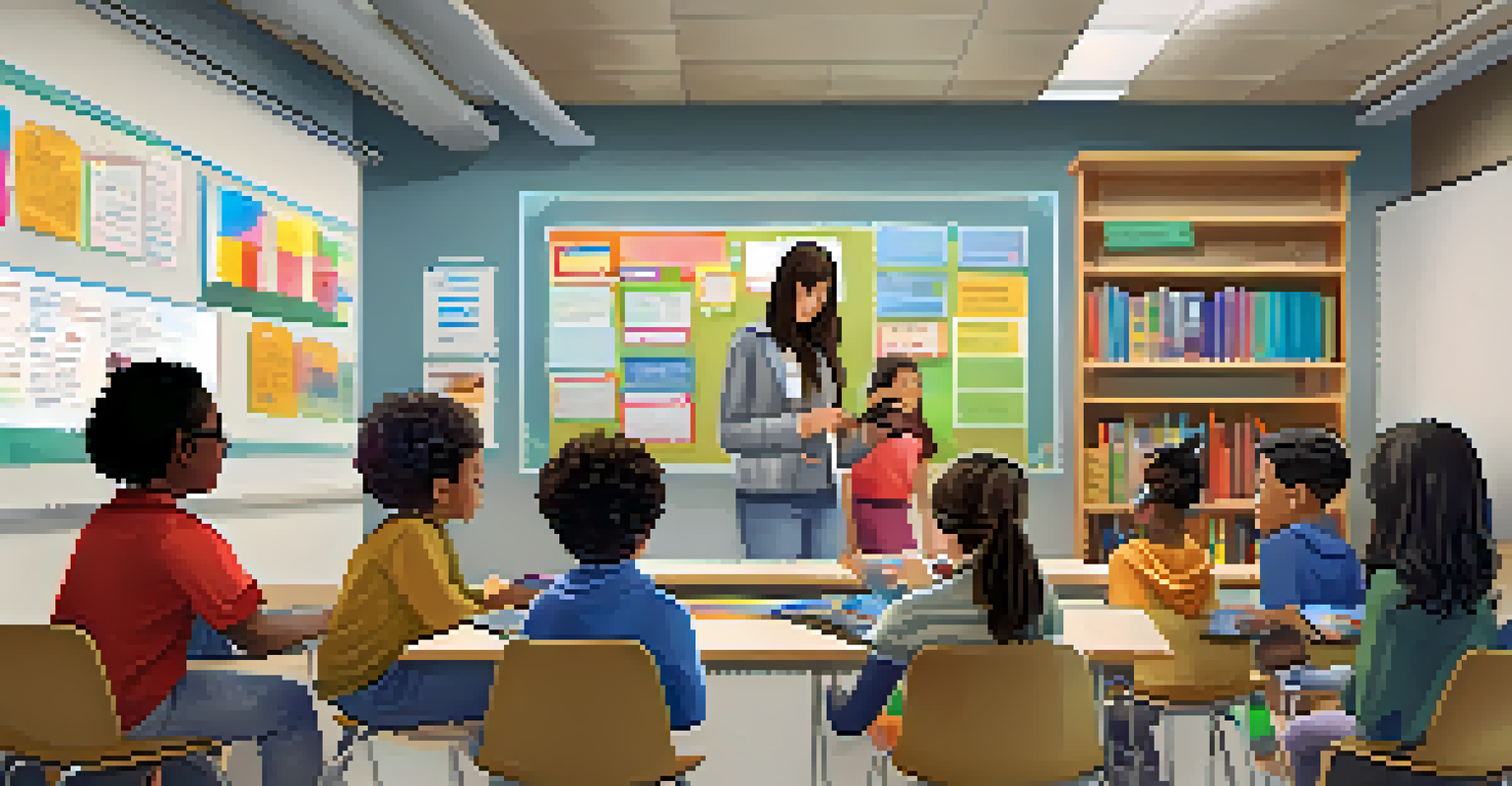AI-Powered Personalized Learning: Tailoring Education for All

Understanding AI-Powered Personalized Learning
AI-powered personalized learning refers to using artificial intelligence technologies to tailor the educational experience to individual students. This approach recognizes that each learner has unique strengths, weaknesses, and preferences. By analyzing data from student interactions and performance, AI can create customized learning paths that make education more effective and engaging.
Education is not the filling of a pail, but the lighting of a fire.
Imagine a classroom where every student has a curriculum designed just for them, like a tailored suit that fits perfectly. AI can assess a student’s knowledge level, learning style, and even emotional state to recommend resources and activities that resonate with their personal learning journey. This means no more one-size-fits-all education; instead, it’s about meeting each student where they are.
As we dive deeper into this concept, it’s essential to grasp how AI analyzes vast amounts of data swiftly. This capability allows educators to understand student needs better and adjust their teaching methods in real time, ensuring no one gets left behind.
Benefits of AI in Personalized Learning
The benefits of AI in personalized learning are substantial, with the most significant being enhanced student engagement. When learners interact with tailored content that suits their interests and pace, they are more likely to stay motivated and perform better. For instance, a student struggling with math can receive additional practice that focuses on their specific difficulties, allowing for mastery without frustration.

Moreover, AI tools can provide immediate feedback, which is crucial for effective learning. Imagine a student working on a writing assignment who receives suggestions on grammar and style instantly, rather than waiting for a teacher's review days later. This instant feedback loop keeps the learning process dynamic and continuous.
AI Enhances Personalized Learning
AI technologies tailor educational experiences to individual students, making learning more effective and engaging.
Additionally, using AI frees up educators to focus on what they do best—teaching. With administrative tasks automated and data analyzed by AI, teachers can spend more time interacting with students, fostering relationships, and providing the personal guidance that technology cannot replicate.
Challenges in Implementing AI in Education
Despite the advantages, implementing AI in education comes with its own set of challenges. One major concern is the digital divide; not all students have equal access to technology. This discrepancy can widen the gap between those who benefit from personalized learning and those who don’t, making it essential to address these inequalities.
The greatest danger in times of turbulence is not the turbulence; it is to act with yesterday's logic.
Another challenge is the potential for data privacy issues. With AI systems collecting and analyzing vast amounts of student data, parents and educators must be vigilant about how this information is used and protected. Ensuring transparency and security in data handling is critical to building trust in these technologies.
Furthermore, educators may require training to effectively integrate AI tools into their teaching practices. Transitioning to an AI-driven approach demands a shift in mindset and skill sets, making ongoing professional development essential for successful implementation.
Real-World Examples of AI in Education
Several educational institutions are already embracing AI-powered personalized learning, showcasing its potential. For instance, platforms like DreamBox Learning utilize AI to adapt math lessons in real time based on student input, ensuring an individualized approach that keeps learners engaged. Schools that have adopted such platforms report improved student performance and greater enthusiasm for learning.
Another noteworthy example is Carnegie Learning, which combines AI with cognitive science to provide customized math tutoring. Their intelligent tutoring system analyzes student performance and adapts lessons accordingly, offering a tailored experience that traditional classrooms often lack. These real-world examples highlight how AI can revolutionize educational settings.
Benefits Include Increased Engagement
Personalized content through AI keeps students motivated, providing immediate feedback and freeing educators to focus on teaching.
Moreover, companies like Knewton are working to integrate AI into various subjects, creating a more personalized experience across disciplines. These innovations are paving the way for a future where education is not just about rote memorization but a deeply engaging and individualized journey.
The Role of Educators in AI-Powered Learning
While AI brings incredible opportunities, the role of educators remains pivotal in this new learning landscape. Teachers are not just facilitators of knowledge but also mentors who understand their students' emotional and social needs. Their expertise is essential in interpreting AI-generated data and making informed decisions to enhance the learning experience.
Educators can use AI as a supportive tool rather than a replacement, blending technology with traditional teaching methods. For example, they can leverage AI insights to focus on group dynamics and individual challenges, ensuring that every student feels valued and understood. This hybrid approach fosters a more inclusive environment.
Ultimately, the success of AI-powered personalized learning hinges on collaboration between technology and human insight. Educators must adapt to new technologies while maintaining their core mission: to inspire and guide students on their unique learning paths.
Future Trends in AI-Powered Personalized Learning
Looking ahead, we can expect to witness exciting trends in AI-powered personalized learning. One significant trend is the integration of virtual reality (VR) and augmented reality (AR) with AI to create immersive learning experiences. These technologies can transport students to historical events or allow them to explore complex scientific concepts in a 3D space, making learning more engaging than ever.
Another promising development is the use of predictive analytics to foresee students' learning trajectories. By analyzing past performance, AI can predict future challenges and suggest interventions before issues arise, helping to keep students on track. This proactive approach can significantly reduce dropout rates and improve overall educational outcomes.
Challenges Demand Attention
Implementing AI in education faces hurdles like the digital divide, data privacy concerns, and the need for educator training.
Furthermore, as AI technology continues to evolve, we may see more personalized learning solutions that adapt not just to academic performance but also to students' mental health and well-being. This holistic approach can ensure that education addresses both the intellectual and emotional needs of learners, paving the way for a more balanced and fulfilling educational experience.
Conclusion: Embracing AI in Education
In conclusion, AI-powered personalized learning offers a transformative approach to education that can cater to the diverse needs of all students. By harnessing the power of technology, we can create tailored learning experiences that enhance engagement, foster mastery, and support educators in their vital roles. The journey toward this innovative educational landscape is just beginning.
However, as we embrace these advancements, it’s crucial to remain mindful of the challenges and ethical considerations that come with them. Ensuring equitable access, protecting student data, and providing adequate training for educators will be key to realizing the full potential of AI in education.

Ultimately, the goal is to create an educational environment where every student feels empowered to learn at their own pace and in their unique way. With the right balance of technology and human insight, AI can help us achieve this vision, paving the way for a brighter future in education.